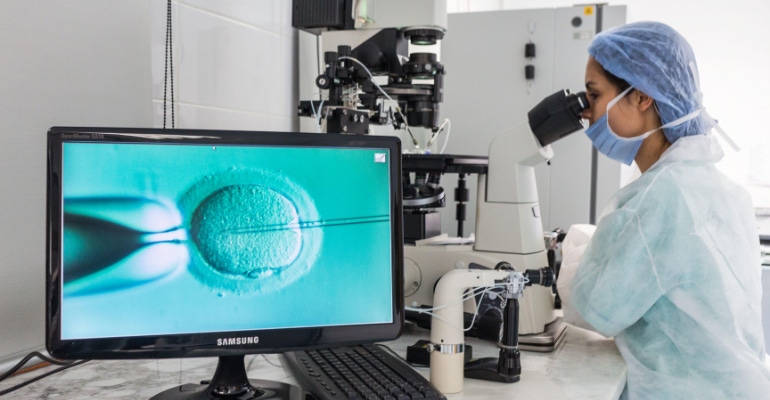Can Transparent AI Analysis Boost IVF Outcomes?
Fairtility just raised $15 million in series A funding to support its transparent AI analysis technology for better in vitro fertilization (IVF) outcomes.
May 23, 2022

Reproductive health professionals have been slow to adopt artificial intelligence (AI) technologies that could potentially improve in vitro fertilization (IVF) outcomes, in part because there's a lack of transparency in AI analysis. A startup called Fairtility is challenging that paradigm by turning AI-decision support in IVF a transparent process for both clinicians and patients.
Fairtility just completed a $15 million series A round, bringing its total funding to $18.5 million to date. The Tel Aviv, Israel-based company is developing an AI-based embryo quality assessment assistant dubbed CHLOE EQ (Cultivating Human Life through Optimal Embryos). Gurnet Point Capital led the financing, which also included Nacre Capital and other investors.
CHLOE EQ is designed to provide visibility into the biological data that informs the system’s embryo assessment conclusions. CHLOE EQ’s data output is intended to support IVF professionals’ experience and intuition, augmenting decision-making with the collective analysis of millions of data points collected from a diverse set of embryology labs and workflows globally. The goal is to facilitate improved decision-making and informative conversations between clinicians and patients in hopes of reducing the number of IVF cycles to live birth.
“Despite advancements in fertility treatments, IVF still only averages a 30% success rate per treatment cycle,” said Eran Eshed, co-founder and CEO of Fairtility. “We are excited to partner with such prominent investors that are helping us realize our vision of enhancing IVF outcomes and efficiency through digitization. We believe that the transparency and user-centricity of our platform will significantly improve workflow efficiency, and data-driven decision-making for better IVF outcomes. This will make IVF more accessible to a larger population of people contending with infertility.”
Fairtility said it will use the proceeds from its series A funding to advance clinical research with fertility clinics and marquee academic institutions globally, as well as in regulatory approval processes. The company continues to develop CHLOE beyond embryo assessment to span the full breadth of in vitro fertilization treatment.
“We are truly excited to partner with Fairtility as they connect state of the art technology to improve women’s health and provide better infertility care for those desiring a family,” said Sophie Kornowski, a senior partner at Gurnet Point Capital. “After a long and thorough diligence process, we believe that Fairtility has the best in technology and ability to execute on our shared vision.”
Howard Morgan, chairman of Nacre Capital, also touted Fairtility's approach.
“IVF is a field of medicine that is primed for AI adoption, yet current solutions remain limited in their scope. IVF professionals are not given access to data that explains AI outputs; clinicians today are asked to ‘trust’ the system,” Morgan said. “Fairtility’s approach is above the rest technologically with all the ingredients needed to create profound transformation in this market – world class data-scientists, fertility specialists and no less important, an experienced leadership team which has built numerous successful companies.”
Another company developing AI-based solutions for in vitro fertilization include CooperSurgical. A 2020 study observed a 13.4% increase in ongoing pregnancy and live birth rates when embryos produced through IVF were tested with CooperSurgical’s PGTai 2.0 technology, when compared with prior next-generation sequencing technologies. The retrospective study, conducted by NYU Langone Fertility Center and CooperSurgical, concluded that one additional embryo transfer out of every 12 achieved this milestone when using PGTai 2.0, which is statistically significant.
What does Bill Nye Say About Advanced IVF Tech?
In 2017 Netflix brought Bill Nye back to television, this time with a talk show for adults. In season 1, episode 2 of Bill Nye Saves the World, the Science Guy explores advanced IVF technologies, with a focus on "designer babies."
"I know it sounds creepy, even the phrase is creepy like I'm talking about a Gucci handbag or something, not a person," Nye said. "Before you start picturing an army of genetically-identical baby Bills in tiny bowties and lab coats, which doesn't sound that bad, let me explain. Designer baby is a messy, catch-all term."
He goes on to talk about both the benefits of genetic editing, as well as the reasons the technology has sparked a lot of debate in recent years. The episode also features a visit to LA IVF, a Los Angeles, CA-based IVF clinic.
"The genetic testing and chromosome analysis have advanced so dramatically that it has really become an essential part of our practice," said Aykut Bayrak, MD, founder and medical director of LA IVF.
Testing embryos genetically is not a part of routine IVF, Bayrak said. Routine IVF involves obtaining embryos and based on their appearance the clinic grades them, he said.
"Unfortunately, looks can be deceiving," Bayrak said. That's where advanced genetic screening of eggs and embryos can make a world of difference for couples who go the IVF route to have a baby.
About the Author(s)
You May Also Like



.png?width=300&auto=webp&quality=80&disable=upscale)
